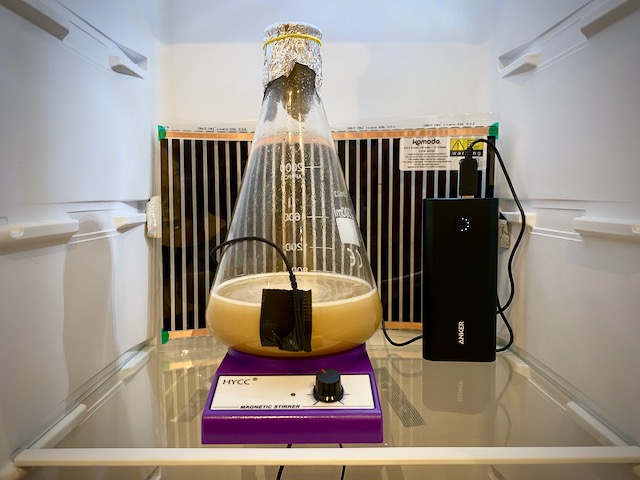Just poured myself a pint of this and it’s very nice indeed. Lovely light colour, very easy drinking taste, good aroma of hops. In fact it’s so light that I probably ran more beer through the freshly sanitised lines than necessary, because I thought it must still be mixed with StarSan.
Continue readingJubilee Clip
| Ref | 2022-05 Jubilee Clip | Brewer | Pain & Patience |
|---|---|---|---|
| Style | Golden Ale | Type | Beer, all-grain |
| Started | Mon 16th May 22 | Status | Archived, |
| Packaged | Mon 30th May 22 | Fermenter | Fermzilla |
| Handle | 2022-05 Jubilee Clip |
|---|---|
| Brewer | Pain & Patience |
| Style | Golden Ale |
| Type | Beer, all-grain |
| Fermenter | Fermzilla |
| Status | Archived, ABV |
| Started | Mon 16th May 22 |
| Packaged | Mon 30th May 22 |
I’ve just filled a 19 litre Cornelius keg to the brim and also 2 plastic PET 1 litres bottles, using usual gravity method without filters, but this time leaving the FV in the fridge and doing it in-situ to see if I end up with less trub in the brew. Also added half a crushed Campden tablet to combat oxidation.
Everything went well, even if I nearly forgot about the rapidly filling keg while having a conversation on the radio. Oops! Measuring the FG was nearly impossible due to the nearly spot-on carbonation (glad I stayed at 10 PSI) but I think I’m seeing 1.011 @ 13℃ which makes for 1.010 and therefore 5.1%. There’s a fair amount of cloudiness in there despite cold-crashing so I’m going to call that chill-haze, and some lovely hop flavours from the trial jar.
What’s not great is the ABV, which even allowing for FG inaccuracy is 1.5% above where I wanted it. Could we have done with another two litres fermenter top-up? Not sure. Maybe I’ll try adding an extra 5 litres sparge water to my next recipe.
It’s been two days since dry-hopping, so last night I tweaked the spunding valve up to 12 PSI for some extra leeway and this morning I set the Inkbird for 1℃. I expect we’ll drop to around 8℃ / 5 PSI throughout the course of the day.
The fermentation curve has flattened out so I’m dry-hopping this 2 days early with the hope that I may still get a little bit of CO2 produced and minimise oxidisation induced by just chucking in the hops via top hatch, quick and dirty.
Before opening the FV I slowly de-pressurised to 5 PSI via the PRV and then started unscrewing the top hatch until it continued to empty itself that way, which saves wrestling with the otherwise stuck lid.
Having dumped the hops, partially closed the bottom valve to prevent them sinking into the jar, and fitted the sanitised floating dip tube, I re-fastened the top hatch and refitted the spunding valve and pressure gauge, but did not add any CO2. I’m keen to see how much is produced over the next two days (dry-hopping sometimes seems to kick-start things again) but will add gas manually if nothing happens in order to counteract shrinkage during cold-crashing in 2 days time.
One Hour Later
And we’re back to 10 PSI. Amazing. I’m reducing gently to 5 PSI via the PRV in order to let out what is hopefully just oxygen from the top of the FV, confident it’ll re-fill itself soon enough.
Nothing special to report apart from a couple of process variations on this brew day, where I was assisted by Dad since my family were visiting from across. Maybe worth noting:
- Measurements entered into Brewfather were not corrected for temperature, since I’m now assuming that Brewfather is smart enough to know when the wort will be hot and when it’ll be cool. Mash efficiency now down to a horrid 61% though, presumably because of usual high volume losses and possibly due to ageing malts.
- Topped up the fermenter with 2 litres of cold mineral water post FV transfer, because the ABV was creeping up due to volume losses. Now looking at predicted 5.3% versus planned 4.1% ABV.
- First use of calibrated Tilt Pro. The OG still looks off and it’s levelling out before the planned FG, so I may need to revisit that at some point.
This particular beer is going to be very light so I’m using up half a pack of US-05 that’s been hanging around from a previous brew, letting it spin for 24 hours in 79g of DME and 800 ml of water, then letting it sit static for another 24 hours, so 2 days in total before pitching.

The Power of USB
It’s been fairly warm in the house over the past week and I can’t really find a cool spot for my starter, so I’m putting it into the fermentation fridge at 18℃. This yeast is supposedly happy at 12 – 25℃ and I’m pointing it at 18 since we’re building it over two days.
Oh, the USB? I don’t want to run a lead into the fridge via the door (and risk deforming the magnetic seal) and the drain hole is already taken up by the leads for Inkbird’s sensor and heat pad, so I thought I’d try running the stir plate using a USB power bank instead of mains power. Seems to be doing the job very nicely; I’ve probably used about 25% of the Anker’s total reserves in the course of 21 hours, so I’m not at all worried about it running out.
